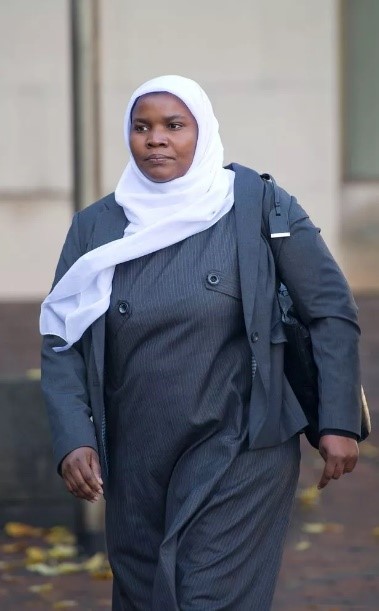Part IV. The Case of Dr. Hadiza Bawa-Garba

Dr. Bawa-Garba likely admonished herself for not thinking about sepsis instantly, for not insisting that the chest radiograph be done immediately, for not reviewing the film sooner, for not starting the antibiotics, for not being clear that under no circumstances was Jack to be given enalapril, immediately; and, most of all, it is likely she omitted that she was doing the work of three registrars that day, that she had had a long hiatus from clinical medicine, that she was new to the hospital, that her consultant did not help out. In a cruel twist, her personal reflections–instead of purging her of guilt and delivering her from purgatory, would later deliver her to the objective and unfeeling hand of justice. She was to learn that she was the scapegoat to protect the system which averred that to err is homicide, and the system could salve its nonexistent conscience.
To be fair in cases such as Jack’s, it is not at all easy going after systems. The system is innominate, faceless, and powerful. In the UK, the potential prosecutor has to consider several questions. Who to prosecute—Leicester Royal Infirmary? NHS? England? the Crown? the government? Taxpayers? The important attending? Hardly.
It is easier go after individuals, especially the weakest. It is easier to believe or to convince a jury that a particular doctor “killed” the child, than a system failed to save the child—that is beyond the ken of most individuals or juries. Thus, a Black, Muslim, female, physician wearing a headscarf–who might have been the face of NHS’s glory in a more nearly perfect world–became the face for all its failings. She was easy.
The NHS trust held an internal inquiry that identified several system issues that contributed to Jack’s death. Medical errors can be caused by system issues and physician factors. The American patient safety movement has taken the high road and placed the blame for medical errors on systems. There is also the American Tort system that can target either or both individuals and systems. The truth is that no matter how good a physician, they can be brow beaten by the system which is most times the only recourse for the patient.
The British medicolegal system is not as primed with cash as the American system; large payouts are uncommon to rare; ambulance chasers are unheard of. Incidental to–and even because of–the lack of large financial payouts for medical injuries in Britain, an unusually large number of physicians are prosecuted for manslaughter for patient death from medical error. Restitution of the deceased is, by definition, not possible; so, families of the deceased press criminal charges against the physician for justice as their only recourse. The prosecution is tasked to prove that the physician was criminally negligent in erring.
The first police inquiries did not find enough grounds for a prosecution. However, the Adcocks—Jack’s parents, persisted—understandably, given their circumstances. You do not lose a 6-year-old child to sepsis and just shrug your shoulders. Someone has to bear responsibility even blame; someone has to pay.
Dr. Bawa-Garba, and the two nurses who were caring for Jack, were charged with manslaughter. The case against the pediatric trainee was simple—she was not only clueless but grossly negligent. With the power of hindsight, Jack’s case was dissected in full detail. Sepsis—although known to be the deadly deceiver–became a diagnosis that any half-competent pediatrician should casually be able to detect, including the beleaguered Dr. Bawa-Garba.
Jack’s care was meticulously dissected in the glare of brilliant hindsight. The delay in getting chest x-ray, the delay in reading the x-ray, the delay in prescribing the antibiotics, quickly came to the fore in court. Although the court was exposing system failures unknowingly to itself or to the jury, Dr Bawa-Garba was being held responsible for each failed component. It was as if she was all of NHS and all of NHS was her on February 18. Under that definition, of course, she was guilty.
There was tremendous certainty in the counterfactual. Diagnostic medicine is a fog of uncertainty until you know what the patient had, but that did not factor in the verdict. The jury heard fully about Jack’s delayed treatment. But they did not hear about the other patients who were receiving care in the same hospital from Dr Bawa-Garba.
The jury returned the verdict. Dr Bawa-Garba was found guilty of the crime of manslaughter. She appealed the sentence; but the appeal was denied in December, 2016.
In retrospect–with a bit of thoughtfulness—the judge might have arrived at an alternative interpretation—that Dr Bawa-Garba, hungry, exhausted, and overwhelmed, was at the end of her tether. He might have considered that the attending pediatrician had the most important of the decisions to make; he was the “captain of the ship” as it were. With some sense of compassion, the judge and jury might well have realized that her having mistakenly stopping the resuscitation was less a sign of her incompetence and more a sign that she was decompensating despite a Herculean effort to stay together on that fateful day.
The most merciless expert witness was none other than Dr Bawa-Garba herself. Her electronic portfolio became her confession. She erred, and she had confessed in print to erring. Her reflections on how she could be a better doctor became proof that she was a bad doctor.
The law–for all its failings–is the law, rigid and demanding. One should not expect jurors—lacking medical experience or expertise–to understand how trainees prop up the NHS. But, it is reasonable to expect the GMC [General Medical Council–the regulatory body for physicians which regulates doctors in the United Kingdom. They set standards, hold a register, quality assure education, and investigate complaints]–to understand how the NHS works. Like hyenas drawn to a carcass, the GMC began circling Dr Bawa-Garba. It was not enough that she was convicted of manslaughter—probably wrongfully. It was not enough that Health Education England withdrew her training number [ie, annulled her residency position]. They wanted to make sure she could never practice medicine again. They wanted to erase her name from the medical register. Instead of rescuing the wounded soldier, they wanted to stab her again while she was still bleeding.
Labeling the members of the GMC as “corrupt” misses the point. Although they seem cold-hearted, lack of empathy is not the primary issue. The GMC’s purpose is to protect patients and guide doctors; but in fact, it is an organization that takes an uncompromising stance in favor of its own reputation and the reputation of doctors in general in the public sphere. Any registrar can become a scapegoat for the “good” of the all-important GMC. The GMC investigations are known to cause night terrors; many doctors have committed suicide while under investigation by the GMC. For the GMC, Dr. Bawa-Garba was irresistible fodder.
Consider these excerpts from a tribunal that summarize the thoughts of Mr. Denney—the counsel on behalf of the GMC:
Mr Denney submitted that your performance on 18 February 2011 was so poor that, regrettably, regardless of the remediation that you have undertaken, there remains a risk that there would be a further collapse of standards in the future with an inevitable risk to patient safety. He acknowledged, however, that you had done all you could to remediate the specific failings identified. He further submitted that, given the fact that you have been convicted of manslaughter and received a custodial sentence, a finding of impairment is also required in the public interest.
The first police inquiries did not find enough grounds for a prosecution. However, the Adcocks—Jack’s parents–persisted—understandably, given their circumstances. The court and the GMC agreed with the Adcocks; Hadiza Bawa-Garba had to pay. And pay, she did. She lost her registrar number and the right to practice medicine anywhere, or ever. The following month, she was given a 2-year suspended jail sentence. The GMC and the NHS were absolved by protective silence.
There is a silver lining in the cloud over Dr. Bawa-Garba. On July 2, 2021, the MPTS [Medical Practitioners Tribunal Service] recommended that Dr Hadiza Bawa-Garba’s fitness to practice was “no longer impaired” and that she was now “safe to practice without restriction”. The ruling–which has not been challenged by the GMC–came eight months after the Leicester pediatrician resumed clinical practice in November 2020 ~two years on from a controversial High Court challenge by the GMC that led to her being struck off.


